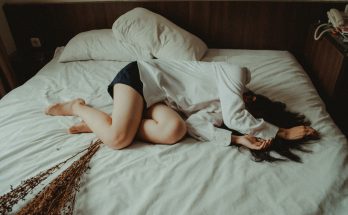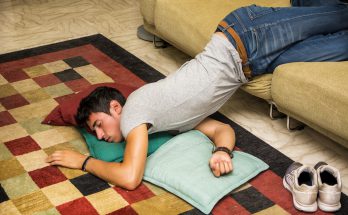Getting a good night’s sleep is easier said than done. If you’re not getting enough shuteye at night, you’re not alone. According to the Centers for Disease Control and Prevention (CDC), about a third of US adults report that they usually get less than seven hours of sleep each night, which is the recommended amount for ages 18 to 60.
Getting enough hours of shuteye is not a luxury – it is a necessity. You need at least seven hours of sleep for good health, otherwise you can be at risk for heart disease, type 2 diabetes, and other chronic diseases, the CDC says. Make your sleep a priority for your overall health and wellbeing!
The problem is quality sleep can be difficult to navigate sometimes. While you may not be able to directly influence the factors that impact your sleep, you can take healthy steps towards optimizing your sleep at night. Here are six big sleep hacks that will help you get a good night’s rest.
Build a sleep schedule with consistent sleep and wake times.
Make sure you build a consistent sleep routine for yourself to get in at least seven hours of sleep each night. Aim to sleep and wake up at specific times and stick to this schedule, the Mayo Clinic says. This plan should be honored as much as possible, even on weekends as it helps your body get accustomed to a sleep-wake cycle, the CDC explains.
“The most important thing you can do is to set a wake-up time for yourself and stick to it 7 days a week. Even if you go to bed late one night, or have trouble falling asleep, keep your wake-up time the same,” says Annie Miller, LICSW, a psychotherapist of DC Metro Therapy. Yes, you may be tired the next day, but it will help you to build a sleep drive and fall asleep more easily in the coming nights.”
Avoid naps longer than 20 minutes.
It may be hard to resist that afternoon siesta, especially if you are quarantined in your home all day. As tempting as they seem, limiting your naps to 20 minutes a day helps you sleep better at night, the Sleep Foundation explains. There are also certain ideal times to take a nap, such as the early afternoon, as it gives your body good rest before bedtime in the evening, the Mayo Clinic recommends.
“If you nap too long during the day, you may feel groggy and it also can make it difficult to fall asleep that night. Long naps can negatively affect sleep drive, our innate need for sleep,” says Miller.
Eliminate light exposure in your bedroom.
Believe it or not, the amount of light exposure in your room can interfere with your sleep. Try removing electronic devices, such as TVs, laptops, and smartphones from the bedroom at nighttime as they can interfere with your sleep.
Electronics emit a sort of blue light that messes with the “sleep” hormone melatonin, making it challenging to fall asleep quickly according to Harvard Health. Make sure to take away gadgets and block other sources of light that may be brightening up your room, like a street lamp or sidewalk lantern.
While there is evidence that blue light at night can negatively impact sleep, it is not something individuals should get hung up about, explains Miller. “People who struggle with insomnia or difficulty sleeping tend to get super focused or even worried about blue light, but really it is more of an issue for individuals with circadian rhythm problems.
Using the blue light filter on your phone or tablet can help at night. Most people with trouble sleeping can do just fine with the night shift filters. It’s more important to focus on sleep, which is a driving factor for insomnia,” she says.
Limit caffeine and heavy meals before bedtime.
Avoid going to bed super full, as the discomfort can keep you awake for a while. Large meals, caffeine, and alcohol should not really be consumed right before bedtime, the CDC says. While a warm cup of tea may be relaxing at night, the Food and Drug Administration (FDA) says it takes four to six hours for half the caffeine you have consumed to exit your body. If you need a quick refreshment before lying down in bed, opt for a caffeine-free drink or fruit instead.
“Drinking [something] before bed can help you fall asleep faster but it worsens sleep quality,” says Miller. She recommends avoiding alcohol and drinking heavy amounts of liquid before bedtime.
Create a comfortable environment in your bedroom.
Find a setting that is ideal for sleeping to receive the best shuteye. Make sure the room is dark, quiet, and cool. Make space for yourself to ease into sleep, the Mayo Clinic recommends. Engaging in calming activities can promote relaxation as you transition into a slumber. Try meditation, deep breathing, and other mindfulness practices to focus into your present state.
“It helps to like your sleep environment, but you want to make sure that the only thing you are doing in bed is sleeping,” says Miller. “That means no reading, watching TV or looking at your phone. Your bed should be the place where you sleep and that’s it. Right now, many people are working from home and end up working from bed. But it’s important to keep your bed just for sleep and work in a separate space.”
Seek professional help if your difficult falling asleep persists for longer than a month.
There may be a lot of underlying factors that could be keeping you up. We all have bad nights occasionally, which is completely normal. However, if you are experiencing difficulties falling or staying asleep for longer than a month, it is time to seek professional help according to the Mayo Clinic.
Dr. Joel Gould, DDS, the founder of Sleep Restoration Program at Modern American Dentistry recommends seeing a sleep specialist with “an organic focus on sleep and a program to help those who know they are not sleeping properly.” Speak to your primary healthcare provider about finding an expert specialized in sleep to get help in achieving your sleep goals.



